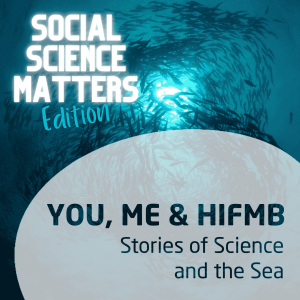
Thursday Feb 20, 2025
Social Science Matters 02 - How to Start Thinking About Social Worlds
Episode overview
This episode shifts our focus to how we might start to think about social worlds in our research. It outlines that how we look at the world – the assumptions we hold about it (what exists, how we know what exists) – is crucial to our start points in research, and drives the kind of questions we might ask about the world. This podcast explores the role of theory (and how it is something we are all using, all of the time anyway!) and positions theory as a useful (rather than intimidating) framework for understanding and interpreting the social world. The episode further considers how theory – thinking about the way we view the world – can open space towards valuing knowledges beyond Western understandings. Finally we consider how the way we think about the world, what we want to find out about it, will also guide the kinds of research questions we ask about it, and choice of methods we engage.
You can tag us on social media #SocialScienceMatters.
Supporting readings
In this podcast we discuss how social science can be integrated with natural sciences – providing a different lens for looking at the world (and marine problems). These articles all deal with integration of marine social sciences with natural sciences:
- Markus, T., Hillebrand, H., Hornidge, A. K., Krause, G., & Schlüter, A. (2018). Disciplinary diversity in marine sciences: the urgent case for an integration of research. ICES Journal of Marine Science, 75(2), 502-509. https://doi.org/10.1093/icesjms/fsx201
- Popova, E., Aksenov, Y., Amoudry, L. O., Becker, A., Bricheno, L., Brown, J. M., ... & Yool, A. (2023). Socio-oceanography: an opportunity to integrate marine social and natural sciences. Frontiers in Marine Science, 10, 1209356. https://www.frontiersin.org/journals/marine-science/articles/10.3389/fmars.2023.1209356/full
- Sanborn, T., & Jung, J. (2021). Intersecting social science and conservation. Frontiers in Marine Science, 8, 676394. https://www.frontiersin.org/journals/marine-science/articles/10.3389/fmars.2021.676394/full
- Strang, V. (2009). Integrating the social and natural sciences in environmental research: a discussion paper. Environment, Development and Sustainability, 11, 1-18. https://link.springer.com/article/10.1007/s10668-007-9095-2
- Barnes, R. A., Elliott, M., Burdon, D., Atkins, J. P., Boyes, S., Smyth, K., & Wurzel, R. (2018). Integrating Natural and Social Marine Sciences to Sustainably Manage Vectors of Change and Inform Marine Policy: Dogger Bank Transnational Case Study. Estuarine and Coastal Shelf Science 234-247 https://papers.ssrn.com/sol3/papers.cfm?abstract_id=3495172 (This paper provides a practical example).
In this podcast we discuss how there are other knowledge systems – ways in which the world can be understood. These are the cited sources:
- George, R. Y., & Wiebe, S. M. 2020. Fluid decolonial futures: Water as a life, ocean citizenship and seascape relationality. New Political Science, 424, 498-520. https://doi.org/10.1080/07393148.2020.1842706
- Todd, Z. (2016). An indigenous feminist's take on the ontological turn:‘Ontology’is just another word for colonialism. Journal of Historical Sociology, 29(1), 4-22. https://mathewarthur.com/whats-new/pdf/todd-ontological-turn.pdf
These papers deal with how theory matters as a framework to understanding. Peters’ article covers why ‘thinking’ and ‘theory’ – ontology (what we know about the world) – matters to marine social science research. No policy work, no work about people is outside of how we think about it. Conde et al’s paper covers this in practice, showing how the ways in which we understand the seabed, shape its practical governance. The Steinberg and Peters paper is the one Kim apologies for, for interested readers!
- Conde, M., Mondré, A., Peters, K., & Steinberg, P. (2022). Mining questions of ‘what’and ‘who’: deepening discussions of the seabed for future policy and governance. Maritime studies, 21(3), 327-338. https://link.springer.com/content/pdf/10.1007/s40152-022-00273-2.pdf
- Peters, K. (2020). The territories of governance: Unpacking the ontologies and geophilosophies of fixed to flexible ocean management, and beyond. Philosophical Transactions of the Royal Society B, 375(1814), 20190458. https://royalsocietypublishing.org/doi/full/10.1098/rstb.2019.0458
- Steinberg, P., & Peters, K. (2015). Wet ontologies, fluid spaces: Giving depth to volume through oceanic thinking. Environment and planning D: society and space, 33(2), 247-264. https://doi.org/10.1068/d14148p
There is a light introduction to theory, in this textbook, and associated ‘study’ website:
- Peters, K. (2017). Your Human Geography Dissertation: Designing, Doing, Delivering. SAGE: London (Chapter 2) https://study.sagepub.com/yourhumangeography/student-resources/chapter-2/sage-journal-articles
No comments yet. Be the first to say something!